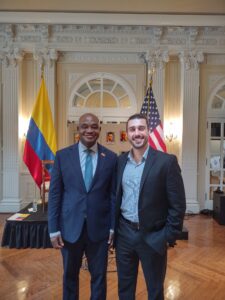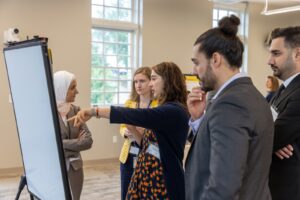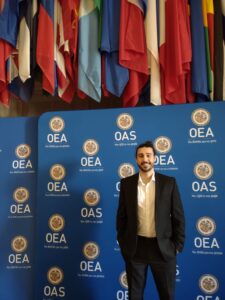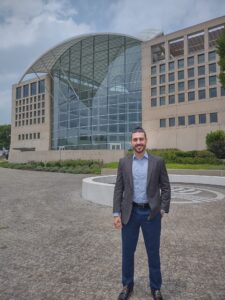“USIP: Working With Local Partners to Prevent, Mitigate, and Resolve Violent Conflicts in Conflict Zones Worldwide”
By Christian Menin (Duke MIDP ’24)
Summer 2023 AFE Blog Post Series

I have to confess that the process of preparing and choosing which path to follow for my Applied Field Experience (AFP) was not easy. First, I had to define some criteria and know what I was looking for in terms of experience, as I wanted my activities to give me clarity and tools for a possible path that I would like to follow professionally. Second, I thought it would be easier to get a job somewhere, but after 40 applications amid final assignments and handing in work, it was really difficult to get an opportunity. Third, here in the US, networking counts for a lot, and I’ve seen that many of opportunities come through this route. Finally, it’s important to do the math and look at financial viability.
Nevertheless, I did land a wonderful internship, and I am really grateful for that. In January, the Duke-UNC Rotary Center took the fellows to Washington D.C., and we were able to visit some organizations and talk to a few of their members. One of those organizations was the United States Institute of Peace (USIP), and during this visit, we had a meeting with the directors of various areas, and I was really impressed with the Institute’s work. Little did I know that a few months later, I would get an internship opportunity with them.
I believe that as I am from Brazil and was working in Colombia for the United Nations Verification Mission, USIP’s Latin America Program was interested in my profile.
Funded by the US Congress, USIP works with local partners to prevent, mitigate, and resolve violent conflict in conflict zones worldwide. To reduce future crises and the need for interventions, USIP works with governments and civil societies to build local capacity to manage conflict peacefully. It is a “think-and-do tank” that unites research, policy, training, analysis, and direct action to support organizations and professionals working to build a more peaceful and inclusive world. Among its priorities are providing fieldwork to help fragile states and their citizens build capacity to reduce and resolve violent conflict, maintaining its field operations to reduce violence in fragile states while increasing its unofficial dialogues and analysis work in areas of increasing danger, and increasing focus on the destabilizing impact of regional competition and major powers on fragile states, with renewed emphasis on Russia and China.

The Latin America Program focuses its activities on the following countries: Colombia, Venezuela, Haiti, El Salvador, Guatemala, Honduras, Nicaragua and Bolivia. Among the activities assigned to me, I would mention the following: reviewing a report on the involvement and activity of the military in the negotiation processes regarding the political conflict in Venezuela; writing an article for publication on the USIP website on guarantees and security for the military in political transition processes; summarizing the 1st Restorative Justice Conference held in Colombia in February 2023; and research on the strategic positioning of the US in relation to the hemisphere and the presence of China; translation of project proposals for Central America; among others.

I can say that the highlights of the AFE were: a) attending a congressional hearing of the foreign relations committee at the Capitol Hill on the topic “Haiti: Next Steps on the International Response”, led by senators Tim Kaine and Marco Rubio, and presenting as witnesses the Assistant Secretary of State to the Western Hemisphere Affairs for the Department of State, and the Assistant Administrator for the Latin America and Caribbean for USAID; b) representing USIP at an event at the Colombian embassy regarding a workshop on artistic weaving and a talk about the memories of the conflict and the peace process between victims, society, military, and former combatants; c) reviewing, rewriting and providing inputs on a 20-page long article about the role of the military in the Venezuelan political conflict and the negotiation processes; and d) participating in the USIP’s discussions about the elections in Central America and Venezuela, the state of exception in El Salvador, China’s influence in the hemisphere, Colombia’s restorative justice and new peace agreement, political transition in Haiti, among others.
I can’t fail to mention the other aspects that made the AFE so important to me. The fact of being in Washington D.C. in itself was incredible, as it opened up the opportunity to meet many organizations and people working in the same field. As we learned when we arrived in the US, networking is fundamental when you want to achieve goals and be more effective in what you set out to do – something that is not well regarded, encouraged or trained in Brazil and other countries.
In addition, being in an environment that gives me a 30,000 ft view of peace and conflict and a better understanding of what happens in a headquarters and backstage gave me was what I was looking for after years of experience focused on fieldwork. At the same time, D.C. is a beautiful, dynamic city – very organized and perfect for bike lovers like me, and these aspects that really counted to the overall results of my AFE. This AFE was a great opportunity for me to contribute to peace in the Americas and certainly helped me to understand the big picture of it through the policy and the US international affairs lens. That is making me rethink some of my research scopes and reshape some of the future professional possibilities I previously had in mind, merging humanitarian work, project management, and field experience with policy analysis and strategic political approach to peace processes.
